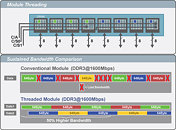- Joined
- Oct 9, 2007
- Messages
- 47,243 (7.55/day)
- Location
- Hyderabad, India
| System Name | RBMK-1000 |
|---|---|
| Processor | AMD Ryzen 7 5700G |
| Motherboard | ASUS ROG Strix B450-E Gaming |
| Cooling | DeepCool Gammax L240 V2 |
| Memory | 2x 8GB G.Skill Sniper X |
| Video Card(s) | Palit GeForce RTX 2080 SUPER GameRock |
| Storage | Western Digital Black NVMe 512GB |
| Display(s) | BenQ 1440p 60 Hz 27-inch |
| Case | Corsair Carbide 100R |
| Audio Device(s) | ASUS SupremeFX S1220A |
| Power Supply | Cooler Master MWE Gold 650W |
| Mouse | ASUS ROG Strix Impact |
| Keyboard | Gamdias Hermes E2 |
| Software | Windows 11 Pro |
Rambus Inc., one of the world's premier technology licensing companies specializing in high-speed memory architectures, and Kingston Technology, the independent world leader in memory products, today announced a collaborative development of a threaded module prototype using DDR3 DRAM technology. Initial silicon results show an improvement in data throughput of up to 50 percent, while reducing power consumption by 20 percent compared to conventional modules.
As demand grows for throughput-intensive computing in notebooks, desktops and servers, the performance requirements on DRAM memory subsystems rises dramatically. As a result, multi-core computing requires more bandwidth and higher rates of random access from DRAM memory.

"As multi-core computing becomes pervasive, DRAM memory subsystems will be severely challenged to deliver the data throughput required," said Craig Hampel, Rambus Fellow. "Our innovative module threading technology employs parallelism to deliver the higher memory bandwidth needed for multi-core systems while reducing overall power consumption."
"Kingston is at the forefront of memory technology working closely with innovators like Rambus to develop advanced solutions," said Dr. Ramon Co, vice president of Worldwide Test Engineering at Kingston Technology. "The collaboration of our experienced teams produced a memory solution that helps overcome a major challenge with multi-core computing."
Threaded memory module technology is implemented utilizing industry-standard DDR3 devices and a conventional module infrastructure. It is capable of providing greater power efficiency for computing systems by partitioning modules into multiple independent channels that share a common command/address port. Threaded modules can support 64-byte memory transfers at full bus utilization, resulting in efficiency gains of up to 50 percent when compared to current DDR3 memory modules. In addition, DRAMs in threaded modules are activated half as often as in conventional modules, resulting in a 20 percent reduction in overall module power.
Rambus will showcase a static demonstration of this prototype at the Intel Developer Forum, September 22 - 24, 2009 at Moscone West in San Francisco, CA. In addition, Rambus Fellow Craig Hampel will discuss the benefits of threaded modules in multi-core computing applications during a talk at the Intel Developer Forum, September 22, 2009, at 11:15 a.m.
View at TechPowerUp Main Site
As demand grows for throughput-intensive computing in notebooks, desktops and servers, the performance requirements on DRAM memory subsystems rises dramatically. As a result, multi-core computing requires more bandwidth and higher rates of random access from DRAM memory.

"As multi-core computing becomes pervasive, DRAM memory subsystems will be severely challenged to deliver the data throughput required," said Craig Hampel, Rambus Fellow. "Our innovative module threading technology employs parallelism to deliver the higher memory bandwidth needed for multi-core systems while reducing overall power consumption."
"Kingston is at the forefront of memory technology working closely with innovators like Rambus to develop advanced solutions," said Dr. Ramon Co, vice president of Worldwide Test Engineering at Kingston Technology. "The collaboration of our experienced teams produced a memory solution that helps overcome a major challenge with multi-core computing."
Threaded memory module technology is implemented utilizing industry-standard DDR3 devices and a conventional module infrastructure. It is capable of providing greater power efficiency for computing systems by partitioning modules into multiple independent channels that share a common command/address port. Threaded modules can support 64-byte memory transfers at full bus utilization, resulting in efficiency gains of up to 50 percent when compared to current DDR3 memory modules. In addition, DRAMs in threaded modules are activated half as often as in conventional modules, resulting in a 20 percent reduction in overall module power.
Rambus will showcase a static demonstration of this prototype at the Intel Developer Forum, September 22 - 24, 2009 at Moscone West in San Francisco, CA. In addition, Rambus Fellow Craig Hampel will discuss the benefits of threaded modules in multi-core computing applications during a talk at the Intel Developer Forum, September 22, 2009, at 11:15 a.m.
View at TechPowerUp Main Site




